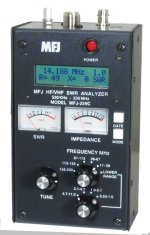Hi Everyone
On my Christmas break I have been trying to sort out a VHF voltage drop.
I am using a standard horizon 1700 about 3 yrs old.
I had it on one boat with a 8' Galaxy Shakespeare -- it worked great. I moved it to another boat with a brand new 8 ft Classic Shakespeare (with a recently soldered pl 259 by me a newbie). Even connected directly to the battery I am getting a massive voltage drop (from 12.5 to 7 volts) with PTT. I changed batteries and still the massive drop
When I put it back to the first boat my voltage drop is so small (maybe .2)
Back to the new antenna connected directly to battery again and massive voltage drop. I tried an old radio I had on hand with the same results.
The only thing common is my new antenna
I checked the soldered end of new antenna for resistance between the outer jacket and center pin. It read "1" which I assume is no resistance.
Is there any way at all that a poorly soldered pl 259 could cause this?
If so I might have to go try a crimped. I watch Dr Bobs pics and tried to follow best I could- may it is not good enough
If you have any suggestions I am all ears. I am at a loss right now. I thought voltage drops could only occur from poor power feeds - not when connected to a good battery directly
thank you
David and Val
On my Christmas break I have been trying to sort out a VHF voltage drop.
I am using a standard horizon 1700 about 3 yrs old.
I had it on one boat with a 8' Galaxy Shakespeare -- it worked great. I moved it to another boat with a brand new 8 ft Classic Shakespeare (with a recently soldered pl 259 by me a newbie). Even connected directly to the battery I am getting a massive voltage drop (from 12.5 to 7 volts) with PTT. I changed batteries and still the massive drop
When I put it back to the first boat my voltage drop is so small (maybe .2)
Back to the new antenna connected directly to battery again and massive voltage drop. I tried an old radio I had on hand with the same results.
The only thing common is my new antenna
I checked the soldered end of new antenna for resistance between the outer jacket and center pin. It read "1" which I assume is no resistance.
Is there any way at all that a poorly soldered pl 259 could cause this?
If so I might have to go try a crimped. I watch Dr Bobs pics and tried to follow best I could- may it is not good enough
If you have any suggestions I am all ears. I am at a loss right now. I thought voltage drops could only occur from poor power feeds - not when connected to a good battery directly
thank you
David and Val



